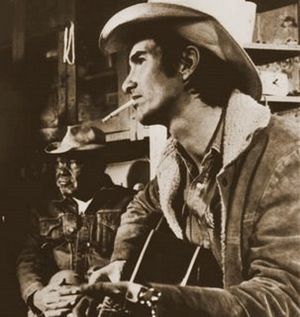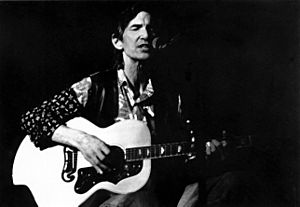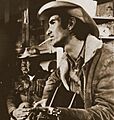Townes Van Zandt facts for kids
Quick facts for kids
Townes Van Zandt
|
|
|---|---|

Van Zandt in Heartworn Highways (1975)
|
|
| Background information | |
| Birth name | John Townes Van Zandt |
| Born | March 7, 1944 Fort Worth, Texas, U.S. |
| Died | January 1, 1997 (aged 52) Smyrna, Tennessee, U.S. |
| Genres | Country, folk, blues, country blues |
| Occupation(s) |
|
| Instruments |
|
| Years active | 1965–1996 |
| Labels |
|
| Associated acts |
|
John Townes Van Zandt (born March 7, 1944 – died January 1, 1997) was an American singer and songwriter. He wrote many famous songs. Some of his best-known songs include "Pancho and Lefty", "If I Needed You", and "To Live Is to Fly". People often describe his music as thoughtful and poetic. He was also known for his great guitar playing and fingerpicking skills.
In 1983, famous musicians Willie Nelson and Merle Haggard sang his song "Pancho and Lefty". Their version became a number one hit on the Billboard country music chart. Townes Van Zandt spent much of his life traveling and performing his music. For a long time in the 1970s, he lived in a simple cabin without electricity or a phone.
Many artists from different music styles have said that Townes Van Zandt influenced them. Some of these artists include Bob Dylan, Willie Nelson, Lyle Lovett, Norah Jones, and Steve Earle. His music has been recorded or performed by many well-known singers and bands.
Townes Van Zandt died on New Year's Day in 1997. He was 52 years old. After his death, more people became interested in his music. Books, a movie called Be Here to Love Me, and many articles have been written about him.
Contents
About Townes Van Zandt
His Early Life
Townes Van Zandt was born in Fort Worth, Texas. He came from a well-known family. His family moved several times when he was young because of his father's job. In 1952, they moved from Fort Worth to Midland, Texas, and then to Billings, Montana.
When he was 12, Townes' father gave him a guitar. He loved practicing it while exploring the outdoors. He once said that seeing Elvis Presley on TV made him want to play guitar and sing. In 1958, his family moved to Boulder, Colorado. Townes really liked Colorado and often visited it later in life. He even mentioned Colorado in some of his songs like "My Proud Mountains."
Townes was a good student and played sports. His parents hoped he would become a lawyer. He decided to go to the Shattuck School in Minnesota. In 1962, his family moved to Houston, Texas.
He went to the University of Colorado Boulder and enjoyed writing poetry. He listened to music by artists like Lightnin' Hopkins and Hank Williams. In 1965, he was accepted into a law program at the University of Houston. After his father passed away in 1966, Townes decided to leave school. He wanted to follow his dream of becoming a musician.
Starting His Music Career
In 1965, Townes Van Zandt began playing regular shows in Houston. He performed at places like the Jester Lounge. He met other musicians there, including Lightnin' Hopkins and Guy Clark. At first, he mostly sang songs by other artists. But his father encouraged him to write his own music.
Around 1967, he lived with 13th Floor Elevators singer Roky Erickson. Erickson wanted him to join his band as a bass player, even though Townes played guitar. But he didn't join the band.
In 1968, Townes met songwriter Mickey Newbury. Newbury convinced him to go to Nashville, Tennessee. There, he met "Cowboy" Jack Clement, who became his music producer for many years. Townes said that Lightnin' Hopkins, Bob Dylan, and Hank Williams were big influences on his music. He also liked artists like Muddy Waters and The Rolling Stones.
The 1970s: A Busy Time
The years between 1968 and 1973 were very busy for Townes. He released six albums during this time. These albums included For the Sake of the Song, Our Mother the Mountain, and The Late Great Townes Van Zandt. He wrote many of his most famous songs for these albums, such as "To Live Is to Fly" and "Pancho and Lefty". These songs helped him become a legendary songwriter in America and Europe.
In 1975, Townes Van Zandt was in a documentary film called Heartworn Highways. The film showed him at his home in Austin, Texas. He was seen playing his guitar and singing his songs. His second wife, Cindy, and his dog, Geraldine, were also in the film.
In 1977, he released a live album called Live at the Old Quarter, Houston, Texas. This album was recorded at a concert in 1973. It showed Townes performing by himself for a small audience. Many people think this is one of his best albums.
During the mid-1970s, Townes changed managers. His new manager, John Lomax III, started a fan club for him. People from all over the world sent letters saying how much his music touched them. Some even said his songs helped them when they felt sad. Townes later went back to his old manager. He continued to play in small places but started performing in bigger venues in the 1990s.
The 1980s and 1990s
Many other artists recorded Townes Van Zandt's songs. Emmylou Harris had a hit song with "If I Needed You" in 1981. Then, Willie Nelson and Merle Haggard made "Pancho and Lefty" a number one hit in 1983. Townes even appeared briefly in the music video for their song.
In his later years, he didn't record as much new music. But he kept writing songs like "Marie" and "The Hole." It is said that Bob Dylan was a big fan of Townes' music. Dylan even asked Townes to write songs with him, but Townes preferred to work alone. They met a few times in Austin, Texas.
In 1990, Townes went on tour with the band Cowboy Junkies. This helped a younger generation of fans discover his music. He even wrote a song for the band called "Cowboy Junkies Lament."
Personal Life
Relationships
Townes Van Zandt was married three times. His first wife was Fran Peterson. They had a son named John Townes "J.T." Van Zandt II. They divorced in 1970.
He then married Cindy Morgan in 1978. They divorced in 1983. They did not have any children together.
His third marriage was to Jeanene Munsell. They met in 1980. They had two children, William Vincent and Katie Belle. Townes and Jeanene divorced in 1994. However, they remained close friends until his death. Jeanene helped manage his music and other affairs.
Around 1993, Townes signed over the rights to his songs and music earnings to Jeanene and their children. This meant his main income came from his concerts. He often gave the money he earned to his ex-wife. At the time of his death, he was in a long-distance relationship with a woman from Germany named Claudia Winterer.
His Passing
Townes Van Zandt continued to write and perform music in the 1990s. However, he became weaker during these years.
In late 1996, he fell down some stairs outside his home and hurt his hip badly. He refused to see a doctor for several days. He was determined to record a new album. When he finally went to the studio, he was in a wheelchair. The recording sessions were canceled because he was not well enough.
He finally agreed to go to the hospital. Doctors found that his hip was broken and he needed surgery. Townes Van Zandt died on January 1, 1997. He passed away from heart problems at the age of 52.
Two services were held for him, one for his family in Texas and another in Nashville for friends and fans. Some of his ashes were buried in the Van Zandt family plot in Dido, Texas.
His Lasting Impact
In Music
Townes Van Zandt is often called a "songwriter's songwriter." This means other songwriters really admire his work. Musician Steve Earle called him "the best songwriter in the whole world." Steve Earle named his oldest son, Justin Townes Earle, after Van Zandt. In 2009, Steve Earle released an album called Townes, which featured only covers of Van Zandt's songs.
Many famous artists have said that Townes Van Zandt inspired them. These include Bob Dylan, Neil Young, Willie Nelson, Lyle Lovett, Emmylou Harris, and Norah Jones. His unique guitar playing style has also influenced other folk musicians.
In 1994, Israeli singer David Broza performed with Townes. After Townes died, he left a box of poems and lyrics. He wanted Broza to set them to music. This led to an album called Night Dawn: The Unpublished Poetry of Townes Van Zandt.
In 2012, Townes Van Zandt was added to the Texas Heritage Songwriters Hall of Fame. In 2015, he was also inducted into the Austin City Limits Hall of Fame.
In Movies and TV
Townes Van Zandt's music has been used in many movies and TV shows. His version of The Rolling Stones' song "Dead Flowers" was in the movie The Big Lebowski. His songs have also appeared in shows like Ozark, Breaking Bad, and True Detective.
In the movie Country Strong, a character is described as "the next Townes Van Zandt." This shows how much he is respected in the music world.
Films and Books About Him
In 2004, a film called Be Here to Love Me was released. It tells the story of his life and music. The film was very popular and received good reviews.
Several books have also been written about Townes Van Zandt. To Live's to Fly: The Ballad of the Late, Great Townes Van Zandt by John Kruth was released in 2007. Another book, A Deeper Blue: The Life and Music of Townes Van Zandt by Robert Earl Hardy, came out in 2008. This book took many years of research and included interviews with his family and friends.
In 2012, I'll Be Here in the Morning: The Songwriting Legacy of Townes Van Zandt by Brian T. Atkinson was published. This book features interviews with other musicians who knew or were inspired by Townes.
In the 2018 movie Blaze, which is about the life of musician Blaze Foley, Townes Van Zandt was played by actor Charlie Sexton. More books and movies about him continue to be released, showing his lasting impact.
Discography
Studio Albums
- For the Sake of the Song (1968)
- Our Mother the Mountain (1969)
- Townes Van Zandt (1969)
- Delta Momma Blues (1970)
- High, Low and In Between (1971)
- The Late Great Townes Van Zandt (1972)
- Flyin' Shoes (1978)
- At My Window (1987)
- The Nashville Sessions (1993)
- No Deeper Blue (1994)
Albums Released After His Death
- A Far Cry From Dead (1999)
- Texas Rain: The Texas Hill Country Recordings (2001)
- In the Beginning (2003)
- Sunshine Boy: The Unheard Studio Sessions & Demos 1971–1972 (2013)
- Sky Blue (2019)
- Somebody Had to Write It (2020)
Singles
- "Waiting Around to Die" / "Talking Karate Blues" (1968)
- "Second Lovers Song" / "Tecumseh Valley" (1969)
- "Come Tomorrow" / "Delta Mama Blues" (1971)
- "Greensboro Woman" / "Standin'" (1972)
- "If I Needed You" / "Sunshine Boy" (1972)
- "Honky Tonkin'" / "Snow Don't Fall" (1972)
- "Fraulein" / "Don't Let the Sunshine Fool Ya" (1972)
- "Pancho and Lefty" / "Heavenly Houseboat Blues" (1972)
- "Pancho and Lefty" / "If I Needed You" (1973)
- "Who Do You Love" / "Dollar Bill Blues" (1978)
- "When She Don't Need Me" / "No Place to Fall" (1978)
- "Dead Flowers" / "Fraulein" / "Racing in the Street" (1993) – German CD single
- "Riding the Range" / "Dirty Old Town" (1996)
- "Ain't Leavin' Your Love" (1999) – US CD single
- "Snowin' on Raton" (2001) – US CD single; from Texas Rain: The Texas Hill Country Recordings
- "Highway Kind" (2002) – CD single
Live Albums
- Live at the Old Quarter, Houston, Texas (1977) – recorded July 1973
- Live and Obscure (1987) – recorded 1985
- Down Home & Abroad (2018) – recorded 1985/1993
- Rain on a Conga Drum: Live in Berlin (1991) – recorded October 1990
- Rear View Mirror (1993) – recorded in Oklahoma, 1978
- Roadsongs (1993) – all cover songs, recorded late 1970s & early 1980s
- Abnormal (1996) – reissued in 1998 with 3 tracks replaced
- The Highway Kind (1997)
- Documentary (1997)
- Last Rights (1997) – alternate version of Documentary
- Together at the Bluebird Café (2001) – with Guy Clark and Steve Earle; recorded September 1995
- In Pain (1999) – recorded 1994/1996
- Live at McCabe's (2001) – recorded February 1995
- A Gentle Evening with Townes Van Zandt (2002) – recorded November 1969
- Absolutely Nothing (2002) – recorded 1991–1996
- Acoustic Blue (2003) – recorded 1994/1996
- Live at the Jester Lounge, Houston, Texas, 1966 (2004)
- Rear View Mirror, Volume 2 (2004) – recorded 1977–80; album credits erroneously state 1976–79
- Live at Union Chapel, London, England (2005) – recorded April 1994
- Houston 1988: A Private Concert (2005)
Videos
- Heartworn Highways (1981)
- Be Here to Love Me (2004)
- Houston 1988: A Private Concert (2004)
- Townes Live in Amsterdam (2008) – recorded November 2, 1991
Compilations
| Title | Album details |
|---|---|
| Last Rights: The Life & Times of Townes Van Zandt |
|
| Masters |
|
| Anthology: 1968–1979 |
|
| The Best of Townes Van Zandt |
|
| Drama Falls Like Teardrops |
|
| The Very Best of Townes Van Zandt: The Texan Troubadour |
|
| Singer Songwriter |
|
| Texas Troubadour |
|
| The Great Tomato Singer/Songwriter Collection |
|
| Legend |
|
| Buckskin Stallion |
|
| Sunshine Boy: The Unheard Studio Sessions & Demos |
|
Images for kids
See also
 In Spanish: Townes Van Zandt para niños
In Spanish: Townes Van Zandt para niños
 | Leon Lynch |
 | Milton P. Webster |
 | Ferdinand Smith |




